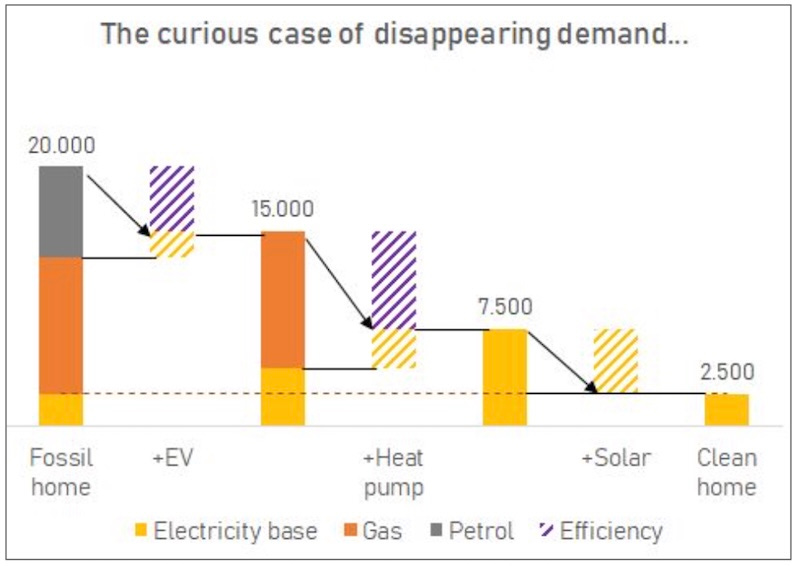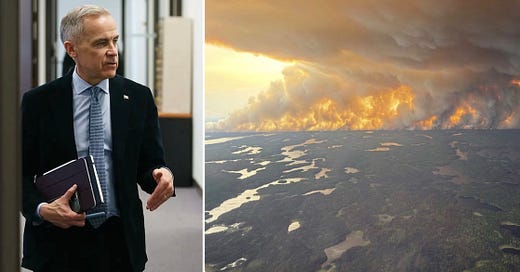Will a Future of Wildfires Be Mark Carney’s Nation-Building Legacy?
Carney can still create a 'put up or shut up' moment for the fossil lobbyists pressing him to abandon environmental assessment and Indigenous rights. But first, he'll have to face one of his own.
The split-screen image is indelible, makes it impossible to look away: 2,000 stranded members of the Pukatawagan Cree Nation in Northern Manitoba, desperate for evacuation from a wildfire just a kilometre from the community, while Prime Minister Mark Carney and provincial/territorial premiers lay plans that may throw fuel on the flames.
On one side of the picture, we have a brutal start to the Prairie wildfire season, brought on by an early heat wave made at least five times more likely by climate change. On the other, we see Carney and the premiers planning to meet in Saskatoon, just 530 kilometres from Pukatawagan and a lifetime of differences away, discussing a new generation of “nation-building” projects that may or may not push Canada’s climate pollution into overdrive.
Pukatawagan is a remote community with no road access. So when the airport was closed by a power outage and smoke, while rail lines were blocked by the flames, first responders were left to evacuate people in two small helicopters with capacity for six to 13 passengers each. Two Canadian Forces Chinook helicopters arrived Saturday, each of them able to carry 35 to 55 passengers plus crew.
With the fire out of control, and apt to shift from east to west at any moment, it wasn’t immediately clear that they would get there in time.
“We’re getting desperate now,” Chief Gordie Bear told CBC News Thursday. “It’s getting rougher. We’re going to be heading for the lake… shortly if nothing turns out, if nothing puts the flame out.”
“We need more resources. We need to move them immediately,” said band councillor Kelly Linklater. “The community is in a panic.”
If you’re wondering where to find climate change’s fingerprints in this wrenching local disaster, Climate Central has got you covered. The heat wave that boosted temperatures up to 13.5°C above seasonal averages in Manitoba and 11.4°C above in Saskatchewan was made at least five times more likely by climate change, the U.S.-based analysts concluded in a new analysis released May 30, and the Prairies are already in mild to moderate drought.
Hunger Games for Megaprojects
What makes this moment a lot more complicated is that, with Donald Trump bringing the continuing threat of annexation to our doorstep, we do need the nation-building projects that will help diversify Canada’s economy and reduce our dependence on a suddenly hostile neighbour to the south.
“In face of foreign threats,” Carney told the Federation of Canadian Municipalities Friday, “a core priority of this government is to build projects of national significance, projects that reinforce our country’s resilience, projects that connect Canada, projects that partner with Indigenous peoples, that diversify our trading partners and create a more sustainable future for all.”
Carney added:
We will move from delay to delivery, ensuring that the Canadian government becomes a catalyst for, not an impediment to, nation-building projects that will supercharge growth in communities both large and small.
The question is whether Carney and his team will pick the projects that make our communities stronger rather than dividing us all over again, devastating local ecosystems and driving up our carbon footprint. In his exclusive interview with CBC’s Power & Politics show in late May—the same one where he said most Canadians don’t see new fossil fuel pipelines as a be all-and all—the PM opined that major projects should compete for federal approval, with the best ones winning out.
“Some projects are good ideas, but they're not ready,” he said. “Others are ready, but they're bad ideas.”
It begins to sound like a kind of Hunger Games for megaproject developers and, please—let the odds be ever in communities’ favour, because the stakes are really that high. On Thursday, CBC reported on a document from the Privy Council Office (PCO), the PM’s secretariat in Ottawa, that calls for “up-front regulatory approvals” for the major projects Carney’s been talking about. The document states:
Once a project is determined to be in the national interest, federal reviews will shift from 'whether' to build these projects to 'how' to best advance them.
And:
It will streamline multiple decision points for federal approval and minimize the risk of not securing project approval following extensive project work.
All of which sounds utterly horrendous or long overdue, depending on which projects are deemed worthy and how they’re assessed. Carney has already signalled that he expects premiers to show up in Saskatoon with their project wish lists (and to show up on time, apparently). You can bet that new liquefied natural gas (LNG) infrastructure will be on British Columbia Premier David Eby’s agenda. And that restoring investor confidence in solar and wind farms won’t be on Alberta Premier Danielle Smith’s.
WWCD? (What Would Carney Do?)
The first ministers’ meeting and subsequent federal announcements may be the moment when the fog around Carney’s intentions begins to fully clear. Where we can discern how well moving with all due haste matches up with moving in the right direction.
In his FCM appearance Friday, the PM’s list of nation-building projects for a group of mayors and local councillors included high-speed rail, port upgrades, and “other infrastructure” that will be “key to diversifying Canada’s trading relationships and reducing its reliance on the U.S.,” the Toronto Star reports.
But that’s not the agenda we’ve seen from the fossil fuel CEOs who’ve been arm-twisting federal and provincial governments to gut climate and environmental protections and fast-track oil and gas pipelines and LNG terminals. They have an ally in Ontario Premier Doug Ford, last seen attacking municipalities’ authority to set green building standards and address flood protection, air quality, and energy efficiency in the midst of a climate emergency. Speaking to the Star as chair of the Council of the Federation, Ford parroted the line we’ve been hearing from the industry, and from the former industry lobbyist they’ve since installed as Alberta premier.
“The previous government and previous prime minister didn’t show enough love, in my opinion, to Alberta and Saskatchewan,” Ford said, pointing a finger at the federal Impact Assessment Act—which its opponents still persist in citing as Bill C-69, its title before it actually because the settled law of the land—as an obstacle to pipeline construction.
“As long as you have Bill C-69 it’s like five steps forward, 10 steps backwards,” Ford said. “We should all be in agreement right across the country, you can’t move forward as long as you have Bill C-69.”
Manitoba Premier Wab Kinew was more constructive, but no less definite, in an interview with Power & Politics last week.
"If we sit around talking about politics, it's going to be like the family dinner table. We're always going to be arguing. But if we get down to work and we choose some economic projects to build the country—that's how we bring people together," he said.
"When we get together for our formal first ministers' meeting with the prime minister, I think you're going to see a unity of purpose."
Unity of Purpose Comes to Pukatawagan
This is certainly a moment when we need to bring everyone together with unity of purpose. We have our #ElbowsUp out of necessity, and Donald Trump’s threat hasn’t gone away, even if his staff have had the good sense to downplay it in recent weeks.
But what does unity of purpose mean in Pukatawagan, Jasper, Upper Tantallon, Chapais, the B.C. Lower Mainland, downtown Toronto, or any of the other places where Canadians have seen the impacts of climate change, have tasted climate change in the backs of our throats, thanks primarily to the burning of fossil fuels?
How does another oil and gas pipeline end boil water advisories and bring decent housing to Indigenous communities that have faced generations of broken promises, or help the more than 50 remote First Nations that are losing the winter ice roads they depend on as fossil fuels fry the planet?
If the answer to that last question traces back to carbon capture and storage, as it always does, how can first ministers expect carbon capture to deliver at the scale and on the accelerated timeline they say they need, when its biggest boosters admit the technology isn’t ready for prime time?
How does a fossil fuel agenda protect Canadian sovereignty and diversify our economy when the oil and gas is owned largely by U.S. shareholders, the international trading partners we hope to cultivate are quickly decarbonizing their economies, and renewables with battery storage can deliver faster, better, and at lower cost than the stuff we need to leave in the ground?
And how does it bring us together around any of those purposes if first ministers rubber stamp new pipelines or LNG projects that will sow Canada-wide opposition, on an accelerated timeline that violates Indigenous consent and environmental assessment principles, only to see them become money-losing stranded assets as global oil and gas demand begins to decline?
Genuine Alarm Over Faster Timelines
If governments are bound and determined to deregulate natural resource development, the next question will be how they think they can adequately assess climate and other environmental impacts and take community concerns onboard, especially in Indigenous communities that have a constitutional right to free, prior and informed consent.
Carney has raised deep worry in the environmental assessment community with his pledge to cut project approval timelines from five years to two—not because anyone is trying to arbitrarily delay good work, but because it legitimately takes time and attention to assess the impacts of big, complex megaprojects and figure out how and whether they can be mitigated. That’s why we have environmental assessment, and industry doesn’t exactly instill confidence in a streamlined process when it can’t even be bothered to warn nearby communities when toxic substances leak.
Some Indigenous communities are already raising serious flags. Anishinabek Nation Regional Chief Scott McLeod was one of several First Nations leaders who told The Canadian Press they were alarmed to receive an outline of the government’s plans last Monday, with a Friday deadline to respond.
“With Prime Minister Mark Carney, we don’t even have a relationship yet,” McLeod said. “And trying to pass a bill in this way, without even talking to First Nations leadership, is a very rocky start for the Liberal government.”
“They’re coming for the resources now,” warned Chief Derek Nepinak of the Minegoziibe Anishinabe (Pine Creek First Nation) in Manitoba. “Be aware of that. Every leader back at home, be ready because they’re trying to kill us with kindness over here.”
Assembly of First Nations National Chief Cindy Woodhouse Nepinak compared the moment to the massive Idle No More protests that greeted the Stephen Harper government’s bid to speed up resource development in 2012.
While the AFN has only seen “bits and pieces” of the proposed federal legislation, “we are concerned about what we are seeing from the government so far, and based on what I’m hearing about similar proposals in Ontario, in British Columbia, and Alberta,” Woodhouse Nepinak told CP. “I fear that this may not end well.”
Put Up Or Shut Up
The weeks ahead are adding up to a “put up or shut up” moment for Carney and the premiers, and might yet produce a moment of truth for the fossil industry.
Here’s one recent example of how things might go reasonably well.
In July 2021, the then CEOs of Cenovus Energy and Suncor Energy, Alex Pourbaix and Mark Little, demanded $50 billion in taxpayer subsidies to get carbon capture technology launched. “We haven’t been able to find any jurisdiction in the world where carbon capture has been implemented, where the national government or the state governments are not very significant partners in that investment,” Pourbaix told Bloomberg at the time.
Then-finance minister Chrystia Freeland responded nearly a year later with $7.1 billion in tax credits that drew criticism for throwing good money after bad, but still fell far short of what the industry was looking for. “Attached to the funding… comes a stiff warning from the federal government for the sector not to drag its feet but, instead, to turn talk into action and deliver on its promises—and quickly,” wrote CBC’s Kyle Bakx.
“It’s as if Ottawa just called the industry’s bet,” Bakx observed at the time, with a subsidy that was to scale up through this decade but be cut in half from 2030 on. More than three years later, the Pathways Alliance still isn’t moving on the project, and the swashbuckling free enterprisers in Canada’s oil and gas sector still have their hands out for more government cash…which is a polite way of saying those hands are still in your pocket and mine.
So now, who’s going to put up, and who’s going to shut up?
If the new, streamlined project assessment processes fall short—if they fall egregiously short—that’s where the PCO’s proposed shift from “whether” to “how” might come into play. If the evidence shows that a project can make Canada stronger on the international scene, but only by undercutting the trust, solidarity, natural environment, and climate future on which we all depend, will officials get the decision right?
If they don’t, how long will that project be held up in court?
And then—if a project is approved, will federal and provincial governments take the cue to pile in with the lavish subsidies that have tilted the scales for past pipeline and LNG development? Or will they create the ultimate “put up or shut up” moment for the fossil industry, in particular, setting the shocking expectation that private sector operators will actually invest their own money in the projects they say they want to build?
(Crazy, I know. But a guy can dream.)
In the ideal world, first ministers in Saskatoon would come forward with nation-building projects that boost Canada’s sovereignty while speeding us along the road to a low-carbon future. Ottawa would devise a streamlined assessment process that still put community concerns, climate impacts, and other environmental considerations front and centre, factored in a project’s alignment with a zero-emission future, and followed the evidence where it leads.
There is no evidence that we live in that world.
But it might be sufficient—just barely—if streamlined approvals become a challenge to companies to get their projects funded by institutional investors that are increasingly attuned to climate concerns, rather than a licence to misdirect taxpayers’ money. That puts the onus on Carney to stickhandle a new assessment process that gets us the robust economy we need to take on Trump, while protecting the communities and the Values (upper-case and lower-) that he set out to defend in the first place.
Or he can follow some premiers’ lead and make a future of accelerating wildfires, heat waves, and more his enduring legacy.
Mitchell Beer traces his background in renewable energy and energy efficiency back to 1977, in climate change to 1997. Now he and the rest of the Energy Mix team scan 1,200 news headlines a week to pull together The Energy Mix, The Energy Mix Weekender, and our weekly feature digests, Cities & Communities and Heat & Power.
Chart of the Week

Landmark German Court Ruling Could Bring Corporate Climate Liability to Canada
‘We’re Getting Desperate’: Chinook Helicopters En Route as 2,000 Stranded by Manitoba Wildfire
Global South Surges Ahead in Cleantech, But Policy Gaps Remain
U.S. House Slashes Clean Energy Tax Credits, Boosts Climate Pollution by a Billion Tonnes Per Year
Most Canadians Don’t See Pipelines as ‘Be All-End All’, Carney Declares
Anxiety, Optimism as Throne Speech Chatter Points Toward Faster Project Approvals
Despite Backlash, More U.S. States Are Considering Laws to Make Big Oil Pay for Climate Change
Canada’s New Energy Minister Tells Oil and Gas Execs It’s Time for Some Quick Wins
Ontario Legislation Could Override Local Green Standards, Stall Climate Progress
'Resources stretched thin,' Premier Scott Moe says, as Saskatchewan wildfires rage on (Canadian Broadcasting Corporation)
Fires drove record loss of world’s forests last year, ‘frightening’ data shows (The Guardian)
Heeding Science Saved Lives in Swiss Glacier Collapse (We Don’t Have Time)
Global solar power set to surpass nuclear (World Economic Forum)
Alberta policies have dampened investor confidence in renewables (Canadian Broadcasting Corporation)
Recruit, Train, Retain: Fostering low-carbon industries through regional workforce planning (Pembina Institute)
Trump hates wind power. But these Texas Republicans are embracing it (The Guardian)
BYD sells more electric vehicles in Europe than Tesla for first time (The Financial Times)
For the First Time, China Invests More in Wind and Solar Than Coal Overseas (Inside Climate News)
Indonesia backtracks on coal phaseout in new 2034 power supply plan (The Straits Times)
Large Decreases in Sea Ice Strength and Pressure Along Major Arctic Shipping Routes Projected for the Next Two Decades (Geophysical Research Letters)
Green Goals, Dirty Fuel: Europe’s Fertilizer Industry Bets on Shale (DeSmog)







